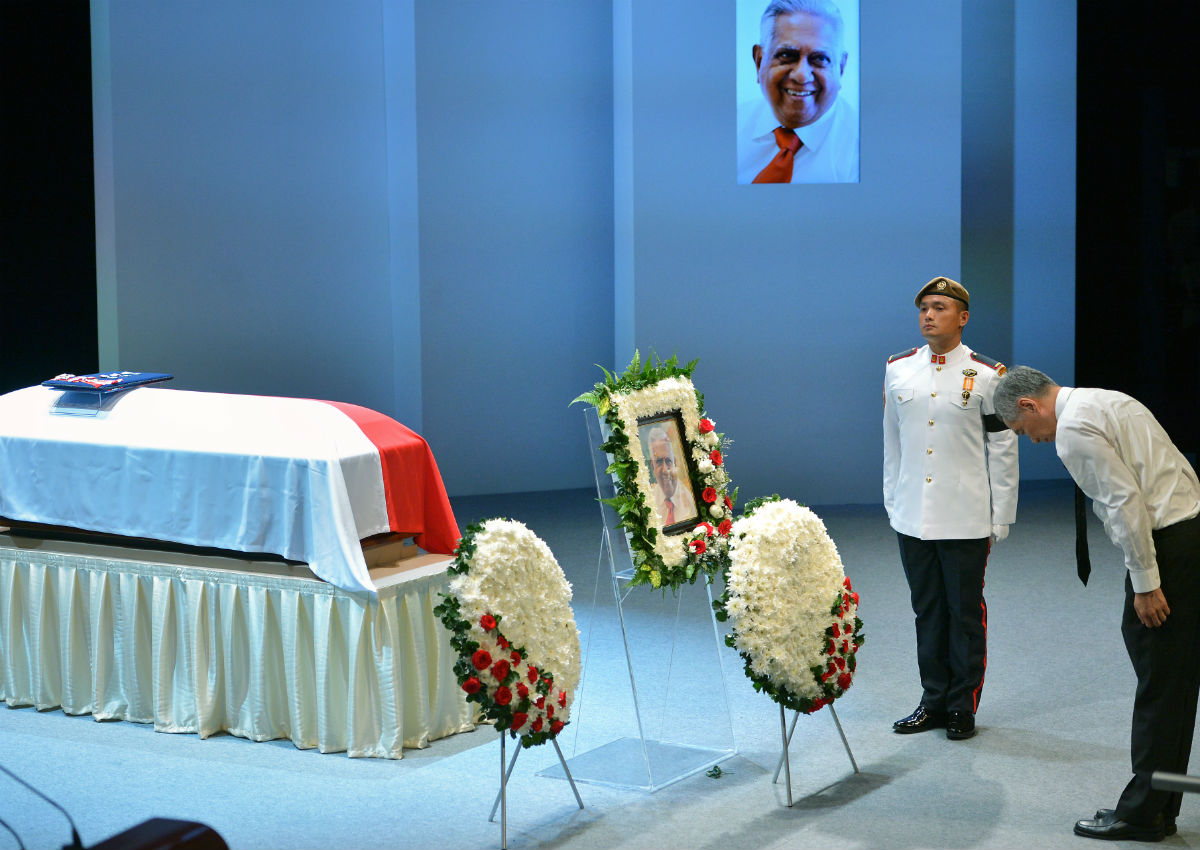And so ends the 92-year-long journey of Mr SR Nathan, who ran away from home at age 16 and ended up in the Istana six decades later as the nation’s sixth president.
The thousands of Singaporeans who showed up at his wake, and stood along the roads under hazy skies to bid farewell as his casket moved towards the University Cultural Centre for the funeral ceremony, were paying tribute to a man who took the highest office promising to minister to “every community in my parish”.
He would stay on to be the Republic’s longest-serving president, making his presence felt not so much as a parson but more in the mould of a retired beat policeman keeping a weather eye on his citizens, while being a caring family doctor at the same time.
Every nation feels touched by its leaders in some way. In Mr Nathan’s case, the contact was often direct – that’s how much he got in the people’s midst, not allowing the gilded cage that is the Istana to affect his downhome style. The 20,000 who came to his wake on Thursday, waiting in line for as long as two hours, were proving a life lesson: If you make time for people, they will make time for you.
In the days after his death, social media lit up with one Nathan story after another as Singaporeans recounted a smile, a touch or a word of encouragement from their erstwhile president. Mr Gopinath Pillai may not be wrong when he says at least half of Singapore households will have a picture of Mr Nathan with a family member.
Every nation has its story of gravity-defying ascent to high office. In the United States, Abraham Lincoln went from a log cabin to the White House. British people know of the story of Dick Whittington, a menial kitchen worker who rose to be Lord Mayor of London. Singapore now has the SR Nathan story.
The day he was born – July 3, 1924 – was of no particular significance except that the Paris Olympics were in full flow. Certainly, no comets were spotted in the sky. The only news that travelled that day was that a 21-year-old Japanese man had been arrested in Osaka for stealing the flag from the American embassy. This fellow said he wanted to do something “heroic” before he died for his country.
Read also: A humble man who put nation first: PM Lee, friends pay tribute to Mr Nathan
Singapore says goodbye to former President S R Nathan
Perhaps there was a divine signal there: In later years, Mr Nathan would have many tangles with the Japanese himself, including one with the Japanese Red Army over the Laju incident. Of other heroics that happened out of sight in his role as director of the Security and Intelligence Division, we will probably never know.
Curiously, one global leader who stopped by to pay his respects to the former president was Japan’s Prime Minister Shinzo Abe, who acknowledged that Mr Nathan had been the first head of state to visit the victims of Hiroshima. In that gesture, Mr Nathan and his small island melded as one: an ability to rise above the painful memories of the Japanese Occupation even as bigger nations find it difficult to shake off the weights of history.
Mr Nathan’s early days fitted the stereotype commonly attached to sections of the Indian community of the time. An alcoholic father committed suicide. There were domestic quarrels. Three older siblings died at a very young age. Superstitions abounded. He wore earrings – to ward off evil – he explained.
From that rough start though, his life embodies the Singapore Story; the hunger to acquire knowledge, the determination to move up in life, and the resilience. Today, Singapore matches Japan for longevity.
Like the nation he would eventually steward, he knew no one owed him a free lunch. Mr Nathan, said Prime Minister Lee Hsien Loong, had no time for self-pity or to look to others for help. The former president put it even more simply: “I learnt to look life in the face.”
Success can be assessed by different yardsticks. One is to take stock of a person’s achievements. The other is to judge him by the difficulties he has overcome. By either measure, Mr Nathan was an unqualified winner. That a man without a full university degree could head external intelligence, the Foreign Affairs Ministry and eventually become president of a nation bedazzled by higher education stands testament to his savvy, efficiency and integrity.

This article was first published on August 27, 2016.
Get a copy of The Straits Times or go to straitstimes.com for more stories.












































































































































